Text by Pham Hoai Thanh
Cover photo courtesy: Vietnam Football Federation - Victorious Vietnam pose with the gold star to celebrate qualification for Lithuania ’21 after the playoff with Lebanon.
Humble Beginnings
For a team that has now earned their second ticket to the World Cup, it was not that long ago that the Vietnam national team trained in the most modest of facilities. But from those humble beginnings, tremendous dedication on the part of both teams and individuals have elevated Vietnam to a level of prestige that was previously unimaginable.
Until as recently as a decade ago, futsal was not on the sports radar in Vietnam. When called on to play in futsal tournaments, the national team consisted mostly of outdoor players who temporarily stepped in to perform international duty. But expertise gradually grew among some to the point that on one occasion three serious futsal players rejected a training camp, accusing the national team staff of calling up a player with inadequate futsal bona fides.
For a long time, futsal matches attracted only sparse crowds such as in this photo: the national cup semifinal in 2017 between the two best teams of Vietnam at that time, only one year after Vietnam’s first World Cup campaign (Photo courtesy: Pham Hoai Thanh archive)
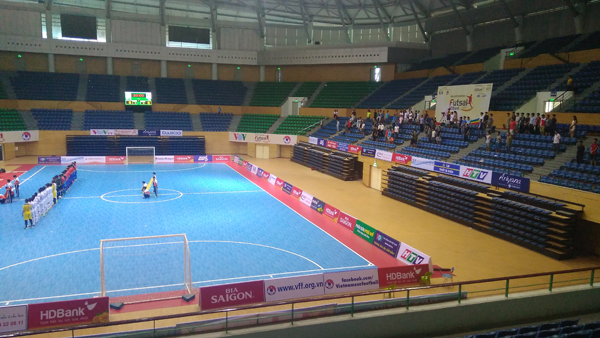
Though Vietnam’s first national championship dates back to 2007, the Vietnam Football Federation still regards futsal as a “non-professional sport.” Due to this status, in the early days there was only one annual national tournament spanning just over one week to nearly three weeks, so it’s really difficult to attract companies to invest for futsal. An all-too-common phenomenon has been participation by teams one year that don’t bother to come the next. Throughout the 14 seasons of Vietnamese futsal thus far, there have been teams that attended the competition only once or twice. Even in 2021, a new team was said to be joining the national league, only to back out in the last minute.
A tournament schedule from the early days in 2009 shows that the national league lasted for over a week, with each team playing almost one match a day (Photo courtesy: Wikipedia)
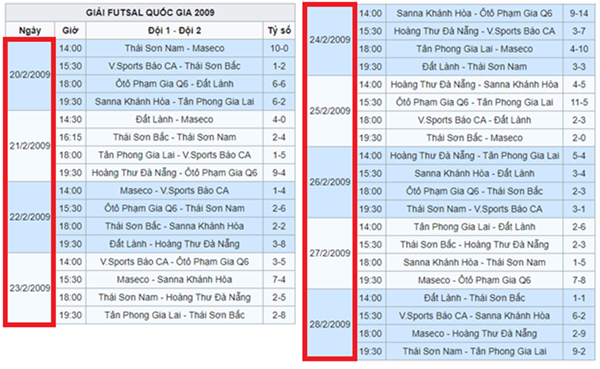
Arrival of the Patron Saint
Unable to equal the popularity of football, futsal had been unable to attract companies to invest. The lack of investment left teams without suitable facilities and therefore unable to build a strong national championship. And as the national championship remained anemic, the facilities for the national team were not much better. In fact, until 2012 the national team often had to train in warehouses to save on costs.
National team players pose with then head coach Sergio Gargelli in a warehouse, with cargo containers barely out of view behind them (Photo courtesy: Misen Ly)
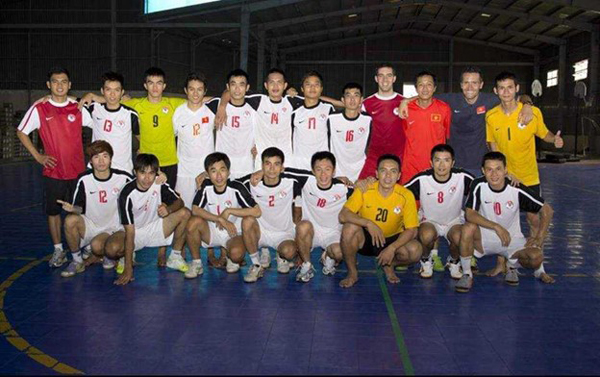
The situation would change in 2012, when club team Thai Son Nam built a futsal-dedicated stadium. The national team finally got a facility to hold proper training sessions.
Thai Son Nam’s indoor futsal stadium (Photo courtesy: doanhnhanonline.net)
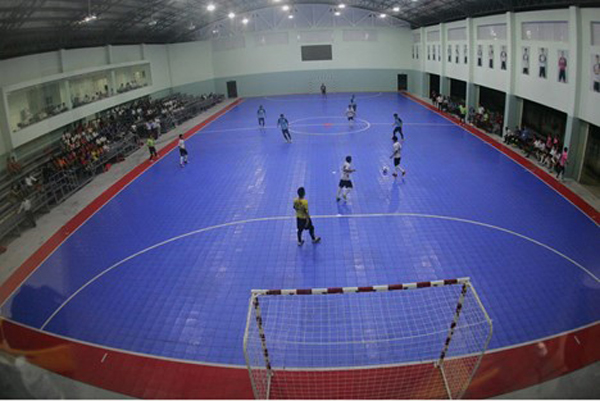
The name Thai Son Nam is synonymous with Mr. Tran Anh Tu, the passionate patron saint of Vietnamese futsal. Anh Tu has generously devoted time, effort and money to build a club that fuels a national team that has twice qualified for FIFA’s futsal world championship. So intense is the devotion of Anh Tu that at international competitions he has gone as far as to personally take over in the kitchen to cook for both Thai Son Nam and national team players when the local food has not been deemed appropriate.
Though not the first champion of Vietnam, Thai Son Nam has gone on become the most successful club and establish a developmental system that is extensive. Over the years, the team has recruited many young players, ranging from U-13s to U-18s, from many provinces throughout the central to the south of the country. In fact, three of the 14 players in Vietnam’s World Cup ‘16 squad had trained at Thai Son Nam for many years, from the time they were only about 15 years old. Although futsal was not very popular at the beginning (and even until very recently), Anh Tu and his colleagues still devoted themselves to developing the best players for both Thai Son Nam and Vietnam by scouting them as young as possible and giving them a good environment in which to train.
Aspiring young players flock to Thai Son Nam trials in 2021 (Photo courtesy: Anh Tran – Sai Gon Giai Phong Newspaper)
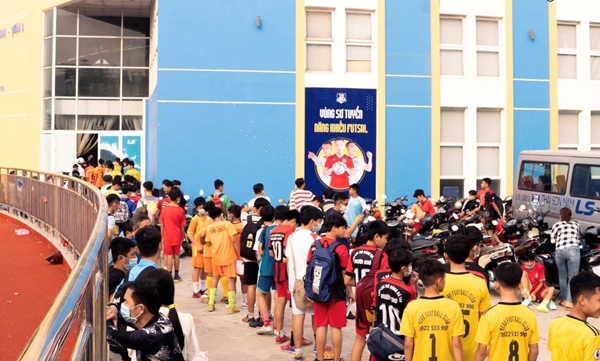
After Vietnam’s defeat of Japan to win a historic ticket to the ’16 World Cup, Anh Tu is on the verge of tears as he embraces Le Quoc Nam, a Thai Son Nam player since 2008 who also took part in the recent AFC playoff against Lebanon (Photo courtesy: Quang Thang)
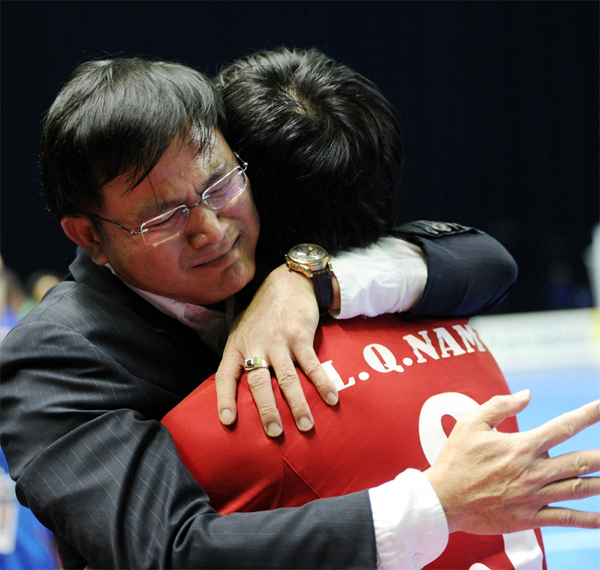
Though Anh Tu deserves immense credit, he was not the only person to bring success to Vietnamese futsal. From the very beginning until the current moment, countless individuals at numerous clubs pitched in with their passion and love for the game. The long list consists of some familiar names such as Tra Dilmah (the first champion of the ’07 national league), Thai Son Bac (champion of the ’10 national league), Tam Nhat Minh (champion of ‘11 national league), V-Sport Bao Cong An Ho Chi Minh, Sanna Khanh Hoa (champion of the ’15 national league), Sanatech Khanh Hoa (champion of the ’19 national cup), Hoang Thu Da Nang, Tan Hiep Hung, O To Pham Gia, Hai Phuong Nam (champion of the ’15 national cup), Benh Vien An Phuoc Binh Thuan, Sai Gon FC, Sahako and many other clubs. The newest arrival is Hung Gia Khang Dak Lak, which joined the Vietnam scene in 2020.
With time, tournaments in Vietnam rapidly grew in number. Since 2015, the national championship has adopted a round-robin format, the same year as Vietnam’s first national cup and prize for the “Best Futsal Player of the Year.” In 2016, the initiation of an awards program produced winners of Bronze Ball, Silver Ball and Golden Ball honors and from 2017 many national league matches started to be streamed on YouTube – most matches since 2018. Now, the top futsal clubs in Vietnam can play three to four major tournaments every year, each lasting longer and including more matches than before.
Futsal players in Vietnam now have an awards program similar to their footballing counterparts (Photo courtesy: Dung Phuong - Sai Gon Giai Phong Newspaper)
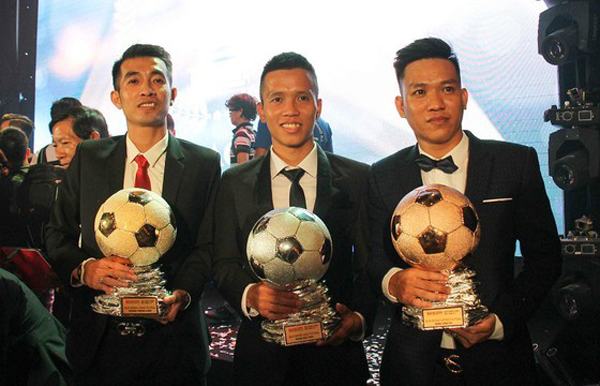
Long gone is the time when you could hear the sound of a pin drop at a league match. In fact, sometimes there are so many spectators that seats sell out and disappointed fans are turned away.
Great atmosphere at a match between top teams Thai Son Nam and Sahako in 2020 (Photo courtesy: Pham Hoai Thanh archive)
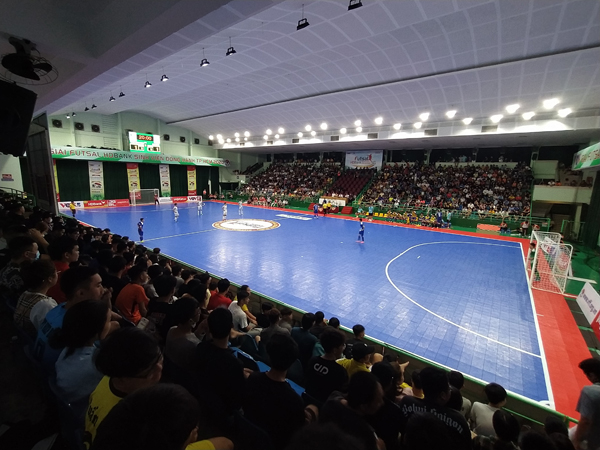
Establishing a Respectable Place in the Global Community
While continuing to develop domestic tournaments, Vietnam has also proudly hosted major regional events such as the ’14 AFC Futsal Championship, the ’17 AFC Futsal Club Championship and the ’17 and ’19 AFF (Southeast Asia) Futsal Championship.
Many unlucky fans are turned away from the semifinal between Vietnam and Thailand at the ’19 AFF Futsal Championship (Photo courtesy: Dan Tri Newspaper)
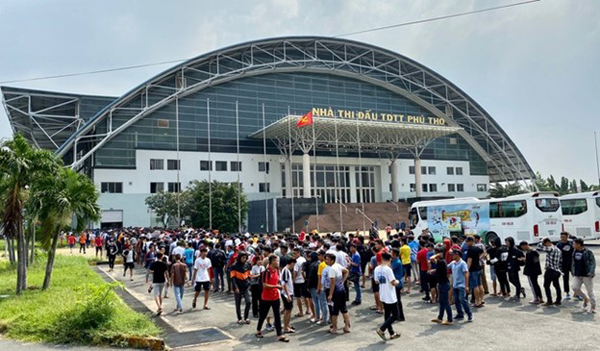
And Vietnamese teams have won silverware at these international competitions, such as Thai Son Nam (three-time 3rd-place finisher and once runner-up in Asia), Sanna Khanh Hoa and Sanatech Khanh Hoa (each runner-up in Southeast Asia).
Vietnamese clubs victorious at Asian competitions (Photo courtesy: Hoang Tung, Doc Lap, Sanvinest Khanh Hoa FC)
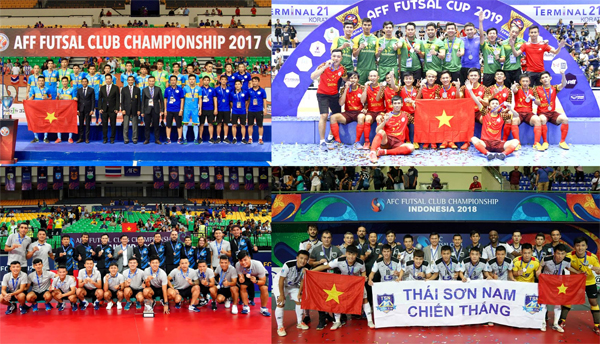
Though foreign players joining Vietnamese teams for international tournaments had been the norm before, Vietnamese players are now attracting the attention of clubs abroad. Nguyen Minh Tri and Tran Thai Huy won the F.League division 2 title in Japan with Y.S.C.C. Yokohama, while Pham Duc Hoa and Tran Van Vu trained with O Parrulo Ferrol in Spain (with Duc Hoa scoring a goal in one official match for Ferrol).
Minh Trí and Thai Huy were champions of F.League div. 2 with Y.S.C.C. Yokohama in 2019-2020 (Photo courtesy: Y.S.C.C. Yokohama)
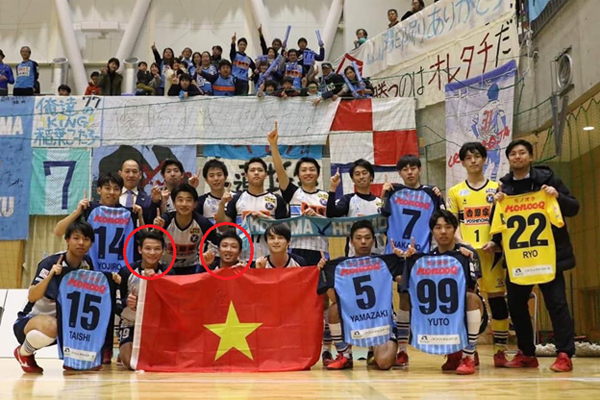
Duc Hoa became a teammate to Morioka and Adri at O Parrulo Ferrol in Spain (Photo courtesy: O Parrulo Ferrol)
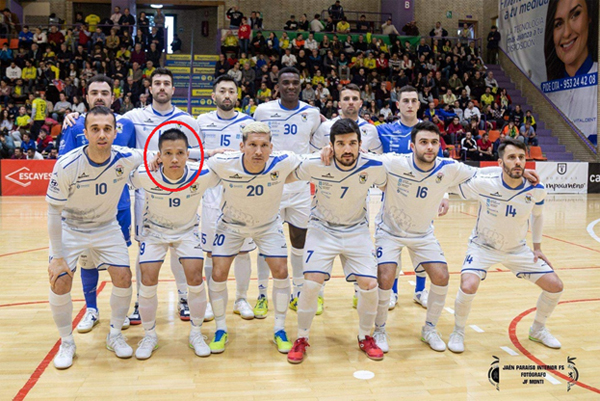
Vietnam still remains a very small fish in the large pond of world futsal, lagging quite far behind the top Asian teams in particular and much of the world in general. Even in Southeast Asia, Vietnam have yet to defeat neighbor Thailand in the knock-out round of any tournament. But let’s not forget in the early days that the top-4 spot in Southeast Asia was outside of the reach of a country that is ready to embark on its second consecutive World Cup finals – or that the first campaign was a huge success, with Vietnam progressing to the round of 16.
Now, look at the warehouse again over 10 years ago. In the photo on the left, Pham Minh Giang is among the Vietnam internationals present. Fast-forward ahead to 2021, and now Minh Giang is the national team head coach, leading the team to Lithuania (in the photo on the right).
From those sweltering training sessions in warehouses and deserted stands at the national tournament, the game in Vietnam has traveled a very long road to reach a respectable position within the global futsal community. Though the outside observer now would have no way of knowing, those of us who viewed this journey from its inception know just how modest things were when it all started.
Minh Giang in his process from national team player to head coach (Photo courtesy: Pham Hoai Thanh archive)
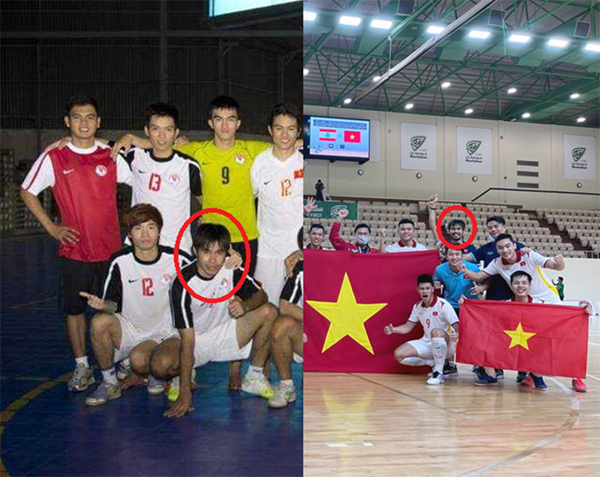
About the author:
- Pham Hoai Thanh
- Date of birth: 18/02/1992
- Location of birth and current place of residence: Ho Chi Minh City, Vietnam
I have played futsal since when I was really young, in primary school, but at that time I didn't know the sport was called futsal. (To me, it was just football with on 5 players each team.) Then, when I was in high school, I started going to watch futsal tournaments and fell in love with this fascinating sport, a passion I continue to have even now. I hope that Vietnamese futsal can continue to develop much more in the future. I always support the clubs and national teams of Vietnam when they take part in international championships. My dream is to build a professional club for myself and to participate in international championships like those.